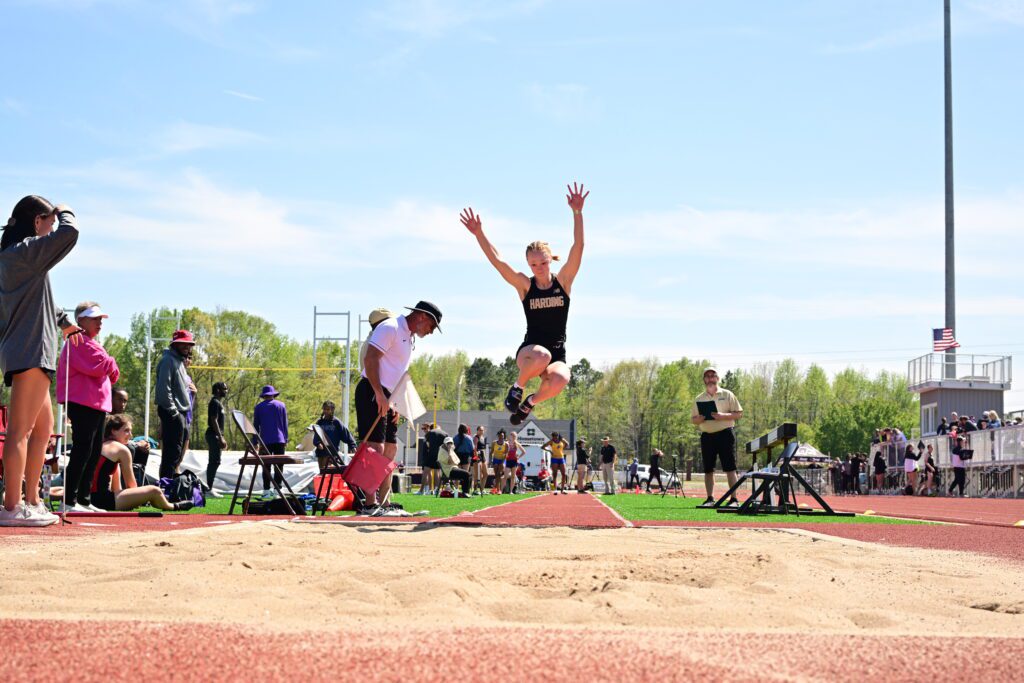
Written By Kelly Mahawanniarachchi// Photo by Jeff Montgomery
The senior year of collegiate athletics marks the culmination of years of dedication, struggle and triumph. For senior athletes, it’s a time to reflect on everything they’ve accomplished, but also to face the bittersweet realization that this chapter of their life is coming to an end. The senior athlete experience is a unique blend of nostalgia, pride and a renewed sense of purpose.
Senior athletes often look back at their collegiate careers with pride. Many seniors have been through the highs of winning championships, breaking records and experiencing the support of fans.
Senior cross-country runner Emily Patterson commented on the pride she feels having made it to her senior year.
“I really think my proudest accomplishment of my athletic career has been sticking with it for so many years,” Patterson said. “Track is a really difficult sport mentally, and continuing to push myself to new levels is something I will always be proud of.”
Women’s tennis alumna Grace Dodd stated her perspective on her college experience.
“Looking back, I am proud of the strength and perseverance I possessed throughout my entire collegiate career,” Dodd said. “I faced many injuries, had four surgeries, had a life changing family issue, and struggled with my mental health. Despite these tribulations, I was able to find success, and ultimately I have had to come to terms with the fact that I left it all out on the court each time I competed, so I couldn’t ask more of myself.”
As the team leaders, senior athletes often face pressure not only to perform but also to guide and mentor younger teammates. Many seniors take this role seriously and see it as a way to leave a legacy.
Senior tennis player Madison Stafford shared several ways she’s found balance as a student athlete.
“From a time management perspective, I build a schedule each week to balance my coursework and tennis commitments while allotting time to FaceTime my family and have lunch or dinner with friends a few times during the week,” Stafford said. “In terms of communication, I try to establish good working relationships with each of my professors and strive to be proactive when there are conflicts between my coursework, tests or labs, and my tennis commitments. I have found if I am consistent with both of these habits, then life as a collegiate athlete is less hectic and more manageable.”
Unlike freshmen, senior athletes have a better grasp on balancing academics, athletics and personal lives.
Patterson gave a word of advice to incoming freshmen on how to balance everything that comes with being a student athlete.
“You will not be successful as a student if you give everything to your sport and your social life,” Patterson said. “You will not be successful as an athlete if you give everything to your academics and your social life. You will not have a healthy social life if you only think about athletics and academics. Take care of every part of yourself to be the strongest version you can be as a student, athlete and friend.”
Dodd also stated advice for incoming freshmen on how to have the best athletic journey possible.
“First, get to know your professors,” Dodd said. “Introduce yourself to them and tell them what sport you are playing. They will be so much more accommodating and willing to help if they have a face to your name. You will also get faculty support at your sporting events. Second, get to know your team. You might be on a team from different parts of the world so it is important to know their culture to make them feel welcomed or to avoid a future misunderstanding based on a difference in cultures. Third, get to know the other sports teams. It is great to be friends with your team, but you also need people outside your teams because you will be spending so much time with them, sometimes you will need just to be away from them and with a different group of people.”